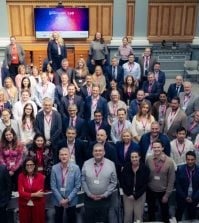‘Drowning in data’: how governments can stay afloat in the information tsunami

At the Government Finance Summit, senior leaders discussed how civil services can make sense of the vast quantities of data available to them
“We’re drowning in data,” said Sarah Glavey, head of public service transformation policy at Ireland’s Department of Public Expenditure, National Development Plan Delivery and Reform. “And at times, we don’t have real clarity over what we need and for what purpose. What data do we have available? What kinds of new indicators might we want to create to drive public sector transformation?”
Speaking in the session on real-time data at the 2024 Global Government Finance Summit – held last year in Dublin, where the Irish government played host to top finance department officials from 12 countries – Glavey was highlighting a widespread concern: that given the constraints on specialist skills and infrastructure, civil servants are struggling to capitalise on the tidal wave of unstructured data pouring through departments. If officials can stay afloat, however, these flows of data represent a huge asset.
During the pandemic, Glavey recalled, “there was a huge collective effort to use all of our sources of data”. Civil and public service data owners, universities, emergency planners and data visualisation specialists collaborated to build a “real-time platform that fed into both Ministry of Health and central government decision-making”, drawing on both “quantitative data from many public service bodies in our system, and weekly panel surveys on public sentiment”.
This provided officials with “lived experience of how we bring together and use real-time data”, Glavey continued – and government is now applying these skills elsewhere. Pulling in data from the Central Statistics Office and the census, Irish officials are building a portal to track public sector initiatives and service provision in some disadvantaged areas. Just as in the pandemic, civil servants are “bringing people together, providing a clear purpose and creating a sense of urgency, this time on the issue of tackling disadvantage”.
Read more: ‘Death to the tax return’: tracking the revolution in revenue collection
Self-reflection services
Data is also key to understanding governments’ own operations and performance. Ireland is currently working to “develop a broad outcomes framework for our transformation programme”, said Glavey, pulling in government data alongside international metrics such as the OECD Trust in Government survey.
Simon Wright-Lakin, Mastercard’s Public Sector Europe vice president for solutions and outreach, highlighted data’s value in monitoring the impact and outcomes of public sector interventions. In Romania, for example, a major EU-funded programme provided payment cards for a range of purposes – including allowing older people to buy food and schools staff to purchase teaching equipment.
The use of payment cards, said Wright-Lakin, enabled programme managers to track both the scheme’s direct outputs – monitoring take-up and purchases – and its wider impact on local economies. “It was really interesting to see how the programme didn’t only help the individuals in need, but also how it created a multiplier effect in the economy,” he commented.

Stats squad
To deliver all these data insights and applications, commented Glavey, there’s a need to “put data in context: to bring data into our environment in terms of the policies that we’re trying to effect, and to develop the capacity across our civil service to do so”. As an example, she cited Ireland’s development of the Irish Government Economic and Evaluation Service: a cross-government network of about 200 economists, recruited and trained centrally then embedded within departments’ research teams to strengthen the use of evidence in policymaking and impact assessment.
A decade on from the service’s establishment, the model is now being applied in other fields. There’s now a “sister service: our Irish Government Statistical Service, recruited and seconded from our Central Statistics Office to sit side-by-side with economist colleagues in ministries’ research functions”, she explained.
Collaboration and coordination
In producing value from its data assets, Glavey said, Ireland’s government has encountered challenges that will be familiar to her colleagues overseas. “There’s a need for greater coordination of activity, reducing duplication of effort and increasing cohesion,” she explained. “Improving data standards and data security is a big goal, and obviously there are issues around cybersecurity.” Civil servants have also hit problems in exchanging data between public bodies.
“Work is underway to tackle barriers and enable the more seamless sharing of data, in line with GDPR and the Data Sharing and Governance Act,” Glavey commented.
This work will be particularly helpful given how many of the most powerful data use cases rest on pooling or cross-checking information. Ireland is – like many countries – “reframing our service delivery around a user-centred approach to life events”, said Glavey, beginning with birth and the processes involved in owning and driving a vehicle. This requires a “fundamental shift, and it’s necessary for us to work across the silos of government”, she added. To support this change, citizens will be provided with “a government digital wallet” holding credentials associated with these life events.
Read more: The tAIxman: how AI is transforming Ireland’s revenue collection
Inevitably, to ID
The digital wallet has been tested by around 100 civil service users, she explained, and the group is expanding to about 1,000: “We’re putting the infrastructure in place, and incentivising the ministries to work with us on a set of core credentials – both with funding, and with design capacity.” The aim is to roll out the approach to cover five life events by the end of the year, said Glavey.
Like many countries, Ireland lacks a universal ID system – making it difficult to confidently identify individuals across departmental boundaries. The country’s solution is a set of “unique identifiers” covering people, businesses and addresses, which all public bodies are being asked to use. Citizens can already access services using a single government ID system, and Glavey said that the introduction of the digital wallet will create a more seamless process. “The key principle is to put data in the hands of the citizen,” she explained. “Whoever the citizen is showing their digital wallet to will see only the information they need to see, depending on their requirements. That builds trust.”
“There is a huge, huge effort to harness data across the system, and quite clear policy and strategy around that,” said Glavey. Guided by a National Public Service Data Strategy, officials are working to develop the management and governance of data; to strengthen key institutions and networks; and to build the skills and working practices required.
“We see data as a building block for so much of our activity,” she concluded. “It is a strategic asset across government and our public services.”
Ireland’s civil servants may encounter choppy waters as they try to keep afloat in this flood of data, but they are rapidly learning to swim.
The invitation-only Global Government Digital Summit is a private event, providing a safe space at which the civil servants leading finance departments and national treasuries can debate the challenges they face in common. We publish these reports to share some of their thinking with our readers: note that, to ensure that participants feel able to speak freely, we give all those quoted the right to review their comments before publication.
The 2024 Meeting will be covered in five reports, covering the various sessions:
– John McCarthy, Chief Economist of Ireland’s Department of Finance, analyses the structural challenges facing advanced economies
– How to improve public sector productivity
– How finance ministries can use artificial intelligence
– Making tax less taxing: using technology to improve assessement and collection
– Using ‘just in time’ insight in government finance and service delivery
For information on the next Global Government Finance Summit, which will be held in June 2025, visit our dedicated website.





















